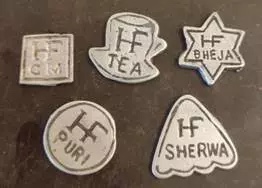
PREV ARTICLE
NEXT ARTICLE
FULL ISSUE
PREV FULL ISSUE
HYDERABAD HOTEL TOKENSIn Hyderabad, India, tokens were used in hotel kitchens, issued in different shapes or with different letters stamped on them to signal what food to cook and serve. The system still survives in some hotels to this day. -Garrett
In the busy hotels of Hyderabad's old city, where the aroma of Irani chai, malai bun, and paya soup filled the air long before the arrival of QR codes, a small metal token was used to manage orders — a system that still survives in a few hotels. It was not a currency coin but a simple handmade token that helped kitchens run smoothly. This system was introduced many years ago, especially in the old city. Customers would go to the counter, pay for their food, and receive a small token instead of a printed bill. Each token, shaped differently to represent a specific dish, was handed over to the waiter by the customer or given by the cashier — signalling to the kitchen what to cook and serve.
For example, a round token meant puri, a triangle stood for sherwa, a star indicated bheja fry, and a cup shape represented tea. Some tokens had letters stamped on them, like The system also helped prevent billing mistakes. Since every item was linked to a token, there was no chance of overbilling. Hotels couldn't prepare more than what the cashier had approved, adding a layer of accountability. The system also helped bridge language barriers, as the staff needed to understand only the shapes of the tokens.
To read the complete article, see:
Wayne Homren, Editor The Numismatic Bibliomania Society is a non-profit organization promoting numismatic literature. See our web site at coinbooks.org. To submit items for publication in The E-Sylum, write to the Editor at this address: whomren@gmail.com To subscribe go to: Subscribe All Rights Reserved. NBS Home Page Contact the NBS webmaster 
|
